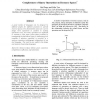Free Online Productivity Tools
i2Speak
i2Symbol
i2OCR
iTex2Img
iWeb2Print
iWeb2Shot
i2Type
iPdf2Split
iPdf2Merge
i2Bopomofo
i2Arabic
i2Style
i2Image
i2PDF
iLatex2Rtf
Sci2ools
SKG
2006
IEEE
2006
IEEE
Completeness of Query Operations on Resource Spaces
A great variety of languages can be designed by different people for different purposes to operate resource spaces. Two fundamental issues are: can we design more operations in addition to existing operations? and, how many operations are sufficient or necessary? This paper solves these problems by investigating the theoretical basis for determining how complete a selection capability is provided in a resource operation sublanguage independent of any host language. The result is very useful to the design and analysis of operating languages.
Distributed And Parallel Computing | Fundamental Issues | Resource Operation Sublanguage | Resource Spaces | SKG 2006 |
Related Content
| Added | 12 Jun 2010 |
| Updated | 12 Jun 2010 |
| Type | Conference |
| Year | 2006 |
| Where | SKG |
| Authors | Hai Zhuge, Erlin Yao |
Comments (0)

